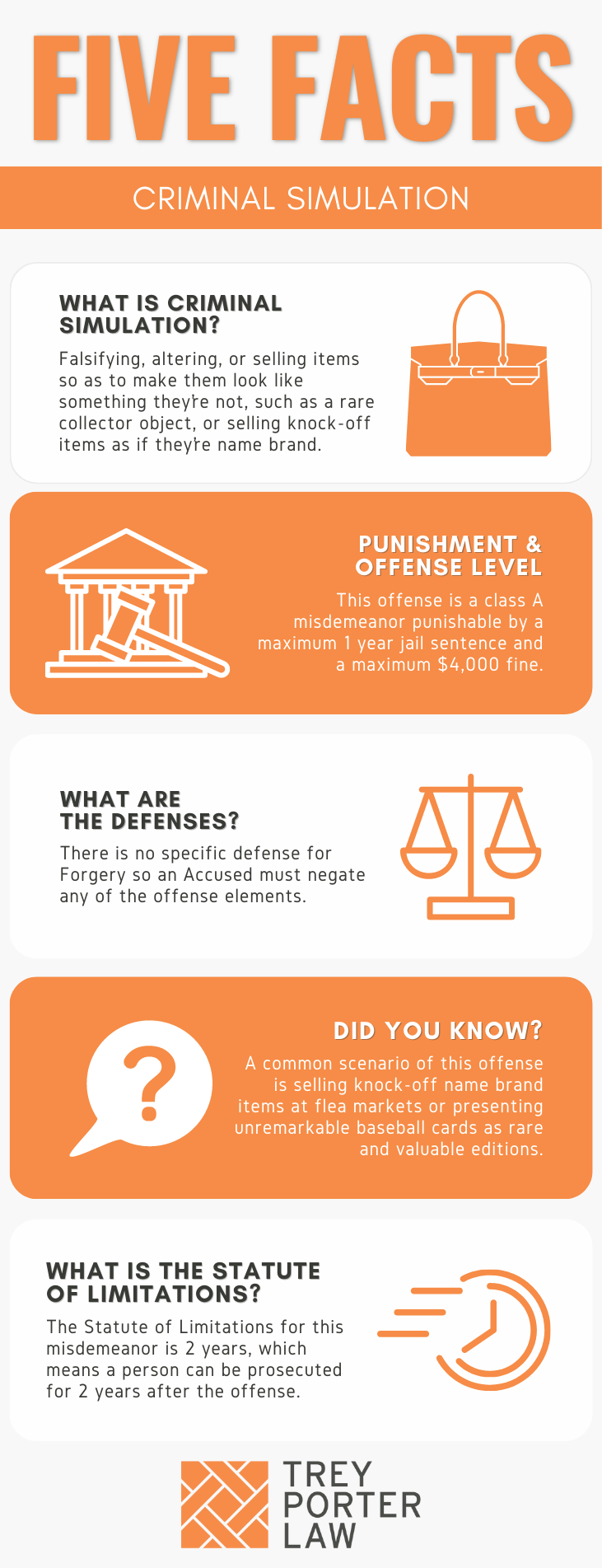WHAT IS CRIMINAL SIMULATION IN TEXAS?
The law against criminal simulation prohibits making or altering objects, or possessing with intent to sell objects made or altered purporting to be something they are not. For example, selling knockoff purses or other brand name items. A person who authenticates an object as genuine, knowing it is a fake, also commits criminal simulation.
WHAT IS THE CRIMINAL SIMULATION LAW IN TEXAS?
Tex. Penal Code § 32.22. CRIMINAL SIMULATION.
(a) A person commits an offense if, with intent to defraud or harm another:
(1) he makes or alters an object, in whole or in part, so that it appears to have value because of age, antiquity, rarity, source, or authorship that it does not have;
(2) he possesses an object so made or altered, with intent to sell, pass, or otherwise utter it; or
(3) he authenticates or certifies an object so made or altered as genuine or as different from what it is.
(b) An offense under this section is a Class A misdemeanor.
WHAT IS THE PENALTY CLASS FOR CRIMINAL SIMULATION IN TEXAS?
Criminal simulation is a Class A misdemeanor, punishable by up to one year in county jail.
WHAT IS THE PUNISHMENT RANGE FOR CRIMINAL SIMULATION IN TEXAS?
The punishment range for criminal simulation, a Class A misdemeanor, is up to one year in jail, and a maximum $4,000 fine.
WHAT ARE THE PENALTIES FOR CRIMINAL SIMULATION IN TEXAS?
A person charged with criminal simulation may be eligible for probation after a conviction, or deferred adjudication without a conviction, for a period of up to two years.
WHAT ARE THE DEFENSES TO CRIMINAL SIMULATION IN TEXAS?
The statute does not authorize specific defenses to criminal simulation. A person accused thereof may assert any defense in an attempt to negate at least one of the elements the State must prove at trial. For example, an accused may argue he or she lacked the requisite knowledge or intent to defraud or harm another.
- What is “the intent to harm or defraud”? The intent to harm or defraud is not defined in the Penal Code, but is given its plain meaning, and may be inferred from the circumstances and common sense.For example, in Singh v. State, defendant who was stalking a victim broke into her home. Police caught him with her mail, and computer drives. He had apparently opened an account with a credit monitoring company in her name, and was convicted of fraudulent use or possession of identifying information. The account application had the victim’s name, date of birth, address, and social security number. She testified she believed, based on her experience with the defendant, he intended to harm her, which was sufficient to uphold the conviction.
WHAT IS THE STATUTE OF LIMITATIONS FOR CRIMINAL SIMULATION IN TEXAS?
The limitation period for criminal simulation, a Class A misdemeanor, is two years.
CRIMINAL SIMULATION IN TEXAS
The law against criminal simulation prohibits authenticating a fake brand name item, making an imitation, or possessing counterfeit items with intent to sell them as authentic.
TEXAS CRIMINAL SIMULATION COURT CASES
The case law regarding criminal simulation in Texas illustrates the statute’s application.
- In Needham v. State, an undercover officer purchased a fake Dooney & Bourke purse from the defendant out of his garage. The officer paid the defendant extra for the patch with the brand name, and saw him attempt to glue it on the inside of the purse. The defendant was convicted of criminal simulation. He argued on appeal he did not hold out the purse as genuine, nor did he act with the intent to harm or defraud anyone.The appellate court affirmed, acknowledging that the defendant could have been convicted of trademark counterfeiting, but the jury could also rationally find him guilty of criminal simulation. No. 05-99-00171-CR (Tex. App—Dallas Jan. 6, 2000, pet. ref’d).













